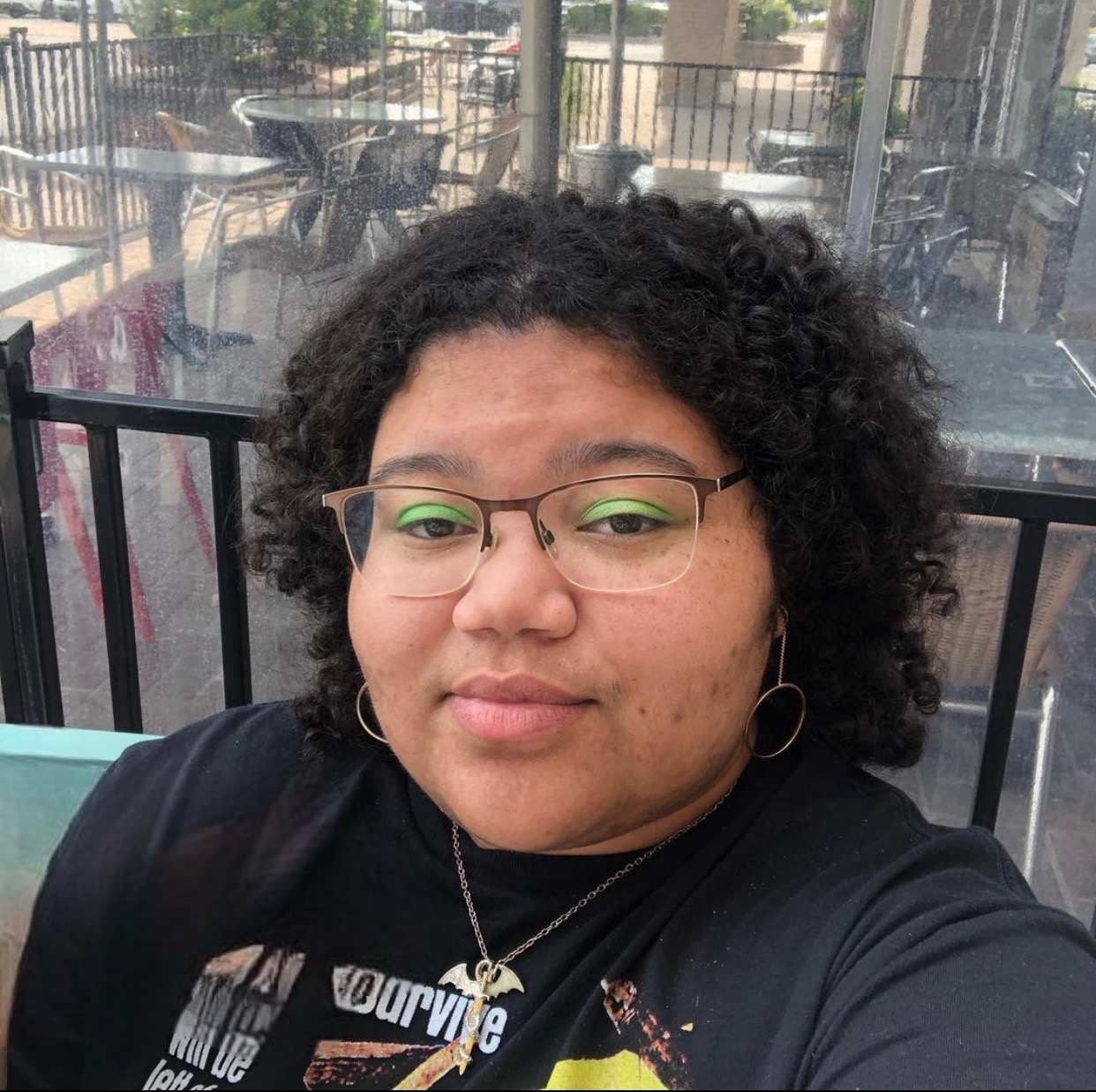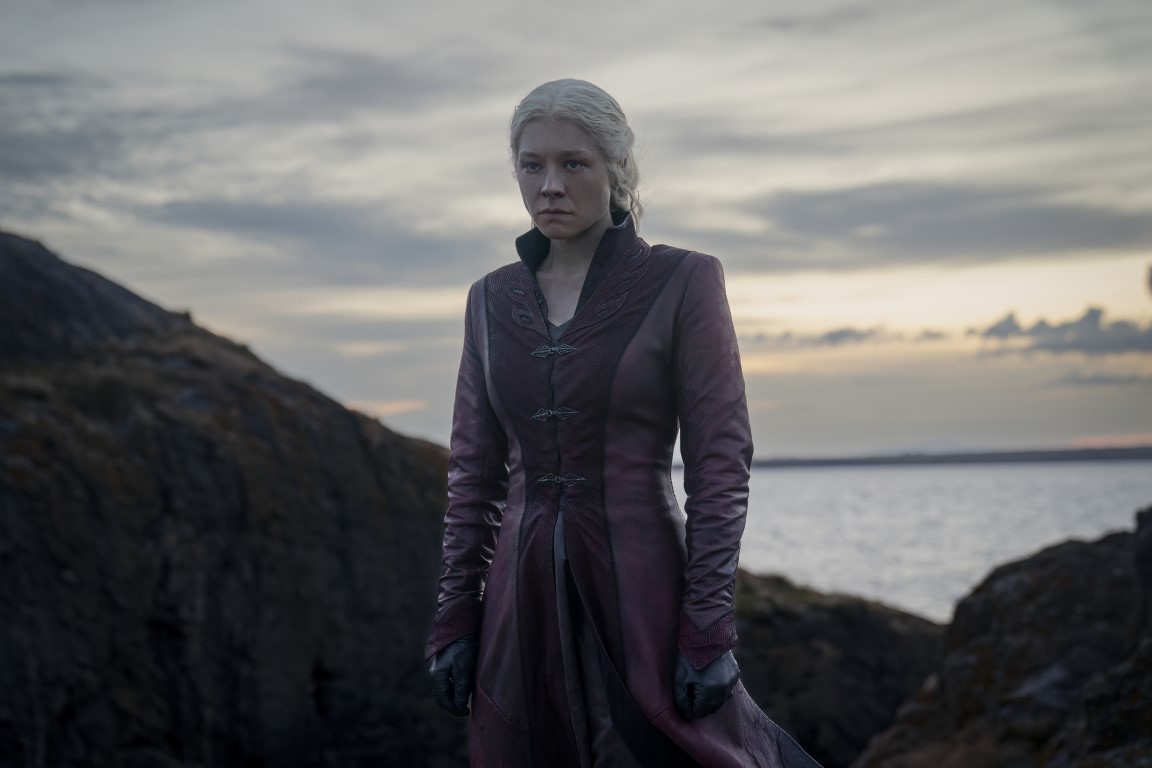In the final episode of season one of HBO’s “House of the Dragon,” Queen Rhaenyra Targaryen (Emma D’Arcy) stared straight into the camera, forehead straining and eyes shining with tears. In the wake of her son Lucerys’ (Elliot Grihault) death, wrath was in her eyes, and fans were left on a cliffhanger that promised spectacle, emotion, and an all-out bloody war. Shockingly, after almost two years since season one premiered, the show is off to another slow start for better, and sometimes for worse.
We begin this new season in the north, with Rhaenyra’s eldest son Jacaerys (Harry Collett) meeting Lord Cregan Stark (Tom Taylor), who tells the prince of the night’s watch and its purpose in keeping the north—and the Seven Kingdoms—safe. As Cregan shows him The Wall, one of the great wonders of Westeros, and begins to tell Jacaerys about what horrors may lay beyond it, they are interrupted by a message: Jacaerys’ brother has been killed.
Throughout the first episode, Lucerys’ death haunts each character on Rhaenyra’s side of the war. From blame being placed on Rhaenys (Eve Best) by Daemon (Matt Smith)—whom he tells could have solved the war if she had simply “Dracarys” in the first season’s penultimate episode—to Rhaenyra who diligently searches the skies and the waters below for a physical confirmation of her son’s death, his memory remains present in the mind of each of his family members who want nothing more than to avenge him.
In King’s Landing, the news of his death brings a sense of uncertainty. Alicent (Olivia Cooke) is disturbed by the killing, but not enough to punish her son Aemond (Ewan Mitchell) who did the act. At the same time, Aemond disguises his guilt with an air of smugness that maintains the guise he puts on for his family. War looms overhead of both factions, and it becomes clear that the grief both Rhaenyra and Aegon (Tom Glynn-Carney) are holding within themselves may end up being their downfalls.

Who is fit to rule the Seven Kingdoms? That is the question that showrunner Ryan Condal seems to be posing for viewers. Is it a grief-stricken mother who, by all accounts, is the rightful heir to the iron throne? Or a young boy who would rather drink himself into a stupor than listen to his advisors? While Condal seems to be adamant that there are no “right” sides to this war, it’s glaringly apparent that actually, there is. Despite this, season two attempts to make a case for each cause, and it’s become clear that the show will try to sway viewers until its final episode.
Gone are the days of villains like Joffrey Baratheon and heroes like Daenerys Targaryen who—up until “Game of Thrones” penultimate episode in Daenerys’ case—remain perfect examples of their archetypes. While George R.R. Martin’s world of ice and fire sees more gray characters than ones who are strictly black and white, for a story like the one “House of the Dragon” is trying to portray, there need to be sides. On those sides, there must be characters for whom casual fans and longtime readers of Martin’s work can root.
The main issue with this season is that the writers don’t even know who they are rooting for. Characters on both sides continue to flip-flop, and in turn, their motivations get murkier by the episode. It’s exhausting to watch at times and frustrating to see such a fantastic first season crumble under the weight of creators who have a disheartening misunderstanding of the story Martin was trying to tell with “Fire & Blood.” At its core, this is a story about a woman being usurped strictly because of her gender, and the dynasty she belongs to subsequently tearing itself apart to keep her away from her birthright.
Despite Rhaenyra being the central focus of both the original novella and the first season of this adaptation, in season two, it almost feels as if she is disappearing from her own show. Yes, Martin wrote “Fire & Blood” about these two warring factions destroying themselves, but at the heart of it lies a warning. Here, it feels like the writers are only giving us a glimpse of the woman plastered on Times Square billboards. She disappears from the narrative for long periods, which is sometimes due to her overwhelming grief, but it also feels as if the writers aren’t sure who they want Rhaenyra to be. It’s a glaring problem within “House of the Dragon’s” second season, and one that makes the future of this character uncertain.
It’s a shame because Emma D’Arcy is a force to be reckoned with when they are on screen. The actor portrays sorrow so intensely it’s hard to look at them, yet you cannot take your eyes away. As their face scrunches up to try and hold tears at bay, I couldn’t help but think that this is perhaps the best performance in anything related to “A Song of Ice and Fire” since the early seasons of “Game of Thrones.” It’s rare for a talent like this to exist in a performer so early in their career, and their performance gets even better when they share the screen with Matt Smith, who continues to make Daemon one of the most captivating characters in the series.

While their relationship took a tumultuous turn in the final episode of season one, under the weight of their joint trauma, the cracks in their relationship grow even bigger. Daemon feels like he can’t trust Rhaenyra to see through her grief and become the ruler she was meant to be, so she cannot see past her husband’s violent and erratic nature. In episode two, the couple engages in a fascinating and equally terrifying argument that brings these fears to a head. D’Arcy and Smith command the screen with a magnetism unfounded in most recent onscreen couples. They work together like two masters of their craft, and it leaves you wanting more.
This argument and what causes it is an example of what the show now seems concerned with: absolution. How one may seek to be free of one’s sins becomes an egregious task, which leads to characters like Alicent and Daemon isolating themselves in a time when they both desperately need to be with their families. However, this attempt at seeking absolution leads certain characters on not only the wrong path for themselves but paths that are, at times, baffling to watch. Certain choices that are made feel glaringly out of character and make the stakes in “House of the Dragon” feel incredibly low. The writing sometimes fails the characters and viewers alike to the point that it’s impossible not to question whether shooting during the 2023 WGA writers’ strike was a mistake.
While the first four episodes of season two are not bad by any means, they do feel like a step down from the glorious second half of season one. The pacing is startlingly breakneck at times, making it feel as if the writers are racing to the finish line rather than giving this story room to breathe, which it desperately needs. Characters who casual viewers were barely given a glimpse of, like Helaena (Phia Saban), are given more depth here. However, because they were relegated to the background in season one you can’t help but question why you should care about them.
But this isn’t to say that giving the supporting cast more to do is the show’s downfall. On Dragonstone, Jacaerys and Baela (Bethany Antonia) are finally coming into their own, and it’s nice to see these young actors given room to showcase their talents in a way that will sure make them fan favorites. Back in King’s Landing, Aegon has also become a more dynamic version of a character that could be one-note, and Glynn-Carney plays each side of this character excellently. Seeing these characters finally take center stage is frustrating because it’s impossible not to feel like they and their talents were showcased too late.
While season two of “House of the Dragon” starts strong, it eventually becomes clear that this series is at war with itself. A tale as poignant as this deserves more space to breathe, and so do these characters that are portrayed by such a brilliant group of actors. The pacing of season one, while not necessarily an issue then, has returned to haunt the series. With only eight episodes, this season may not be able to reach its full potential.
Four episodes were screened for review. Season Two of House of the Dragon premieres on HBO on June 16th.












